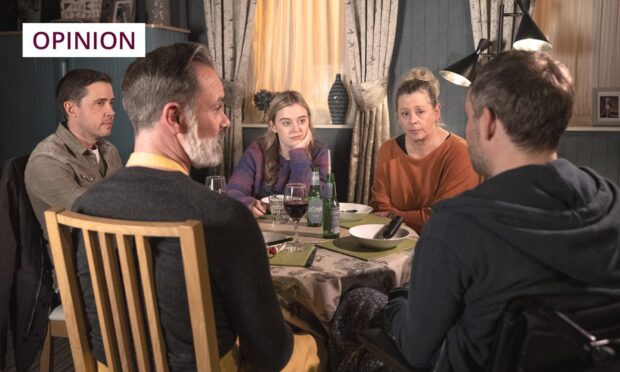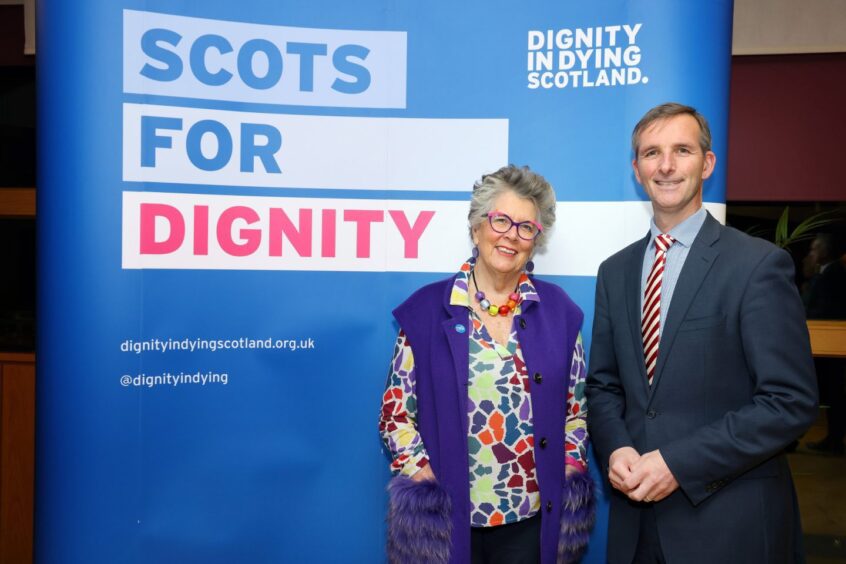I’ve always been a fan of Coronation Street, but I’m finding Paul’s story painful to watch.
They always seem to achieve a perfect balance between humour and grittiness.
It’s now hurting like grit in my shoe with every step of Street character Paul Foreman’s harrowing story.
It’s like a horrific event we don’t want to watch, but can’t stop looking at either.
Paul, played beautifully by actor Peter Ash, is dying from Motor Neurone Disease (MND).
We know he’s dying because there is no cure and only one inevitable tragic outcome.
What makes this affliction so cruel is that the body closes down as the brain’s ability to control muscles fails.
Functions such as breathing and swallowing deteriorate along with mobility, for example.
Yet the brain remains healthy in other respects, so patients are acutely aware of every stage of this terrifying downward spiral.
Like a man in a black hole bound in a straitjacket Paul rages over his fate, but there is time for humour, too.
Ending your own life is illegal, but not unusual for MND sufferers
And planning ahead: Paul wanted to arrange an early death with the help of his partner and friends to speed things along before he became too helpless.
Illegal, of course, but not an unusual route to escape MND’s grip from what I have read and heard.
If he lived in Scotland, Paul would be exactly the sort of person who might benefit from the new bill to enable the Scottish Government to help certain people take their own lives legally.
If passed, Scottish ministers would be blazing a trail in the UK, leading the way over legalising assisted dying, but within tight definitions and medical oversight – rather than Paul’s haphazard DIY scenario.
He would fit the bill as he is over 16, classed as terminally ill with only months to live and of sound mind to make the decision.
The first stage of the legislation was laid before Holyrood by Orkney Lib-Dem MSP and deputy presiding officer
and will return for further debate later this year.
For once, the SNP Government would be in tune with a large body of public opinion which shifted in favour of assisted dying – almost 80% support it, according to polls, but opposing groups are lining up.
Normally the SNP completely misses the mark with some of their daftest, hare-brained ideological showboating.
I’ll briefly mention gender identification, the bottle-recycling scheme, Named Person state-guardians for children likened to a “totalitarian state” by judges, the ferry-spending debacle, trying to make the next general election a referendum on independence and last, but not least, hate-crime law.
Assisted dying bill is bold not reckless
The assisted dying proposal would differ in being bold rather than reckless.
Following similar models to Oregon in the US, the Netherlands and elsewhere.
Checks and balances by medical experts are in place to ensure patients are not coerced into taking their own lives or feeling a burden to relatives.
With Paul, each new episode is more painful to watch – especially when viewed from the sofa while eating dinner.
We are at the stage where his food is blended and a feeding tube is being discussed.
It’s terrifying and enlightening at the same time.
I think the authenticity of Paul’s story is helped by the Motor Neurone Disease Association guiding producers.
They accept a measure of artistic licence is inevitable – just as the tv drama about the postmasters galvanised public opinion.
I wrote about work going on to find a cure after former Rangers star Fernando Ricksen died from MND; he raised £1million as a legacy for research to offer hope.
“We wouldn’t let a dog die like this,” is a phrase we hear when people talk about the suffering of some people.
But the reality of helping someone to end their life through personal intervention is an entirely different matter.
In Oregon they say no one has ever been pushed or abused into a decision since their assisted-dying laws were launched nearly 25 years ago.
How can they be really sure? Do they actually mean that there is no hard evidence?
How can they really know what is happening inside someone’s mind or about family pressures out of sight of the experts?
For many others such legislation is always too late.
Severe dementia robs them of the ability to make any rational decisions over their daily lives let alone death; so they don’t qualify under the sound of mind definition.
Others racked with pain and enduring wretched lives where the end is inevitable, but nobody can actually put a date on it – so they are not classed officially as terminally ill.
There is no respite for them in these extreme cases.
Where their exhausted, worn-out families could be forgiven for thinking that it would be a blessing if their loved ones slipped away naturally in their sleep to end the suffering.
David Knight is the long-serving former deputy editor of The Press and Journal


Conversation